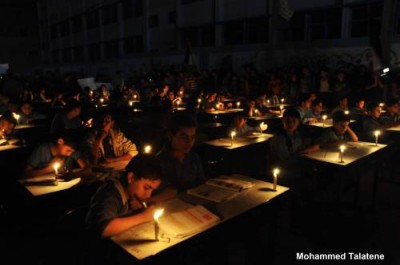The Exacerbating Electricity Crisis in Gaza

In light of the continued siege on the Gaza Strip, and the silence on the humanitarian crises there, the government realized the need to give a detailed picture of the exacerbating electricity crisis:
The electricity problem is not a problem of the day; it’s an old, sequential one, but its severity differed in relation to the number of cut hours.
1. The focal point of the problem dates back to the first days of the PA’s establishment of the Power Generation Company, as the electricity generated had not been enough to meet the need of the overall population of the Gaza Strip because of the interrupted availability of fuel, or the inability to collect the cash necessary to run the power plant in full capacity, and because it had been subjected to a devastating bombing by the Israeli occupation in 2008.
2. The power generation sector has been impacted by the ongoing Israeli siege on Gaza, which contributed a decline to the enclave’s economy as a whole, and to the rising poverty and unemployment rates, and thus affecting the Gaza citizens’ financial ability to pay the electricity subscriptions.
3. The current problem lies in the lack of Egyptian fuel due to the complete closure of the underground tunnels, which have no commercial alternative to serve the Gaza life needs, and in the rising prices of the Israeli fuel.
4. The Government had agreed with the Palestinian Authority in Ramallah to remove the tax imposed on shipping the industrial diesel from the West Bank to the Gaza Strip except for the one called blue tax. It also proposed to remove the VAT to pay 3 NIS per liter, so we were obliged to pay 4.2 NIS per liter to run the power plant temporarily. Lately, the Government has been surprised by the PA retreating from its decision to exempt Gaza from blue tax to demand 5.7 NIS per liter, which is beyond the Power Generation Company’s financial capacity.
The PA levies huge taxes on the Gaza Strip and deducts income taxes worth millions of shekels from its Gaza personnel’s salaries. We expected the PA to relieve the burden on the Gaza citizens through cutting the fuel taxes.
The Main Obstacles Facing the Government to Solve the Problem:
1. The suffocating siege imposed on the Gaza Strip which leads to devastating economic effects.
2. Preventing the entry of the Qatari fuel (roughly 10 thousand tons) already in Egypt.
3. The rocketing fuel prices which affect negatively the purchase power.
4. The total closure of the tunnels.
5. The failure of some citizens to commit to paying the due bills.
6. The increased price of one electrical unit produced by the Power Generation Company to double the selling price which caused serious financial losses.
7. The continuous increase in the population in addition to the establishment of the Qatari housing projects.
8. Banned purchase of fuel.
Demands:
1. The immediate lifting of the siege imposed on the Gaza Strip and allowing entry of fuel.
2. Egypt must help to minimize the suffering of the Gazans through allowing to purchase fuel or enhancing the power plant that feeding the Gaza Strip.
3. The Israeli occupation must bear its responsibilities as an occupier and provide the Gaza Strip with the basic needs including the electricity.
4. The Palestinian Authority must remove all fuel taxes imposed on shipping the diesel fuel to the Gaza Strip and make it available at the import price which is 2.2 NIS.
Alray is the official media agency of the Palestinian Government. Read other articles by Alray, or visit Alray’s website.

